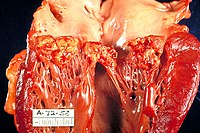
Photo from wikipedia
Postoperative infection is an important factor contributing to poor prognosis after surgical treatment of cerebral cavernous malformations (CCM). However, the predictive factors of postoperative infection-related complications in adult patients with… Click to show full abstract
Postoperative infection is an important factor contributing to poor prognosis after surgical treatment of cerebral cavernous malformations (CCM). However, the predictive factors of postoperative infection-related complications in adult patients with CCM have still not been well established. To identify possible predictive factors of postoperative infection after CCM surgery, we retrospectively evaluated the data of CCM patients who were enrolled into our prospective registry database. The relationship between preoperative characteristics of patients and postoperative infection-related complications was analyzed. A total of 167 CCM patients were included in this study. The average age was 39.69 ± 15.27 years old, and 21 of them had postoperative infection. For patients with postoperative infection, the Glasgow Coma Scale (GCS), Modified Rankin Scale (mRS), white blood cell (WBC) count, and neutrophil (NEU) count were all significantly higher than those of the group without infection. Our preliminary results showed that NEU count might have significant predictive value of intracranial infection, and GCS, mRS and CCM presenting with hemorrhage were all factors significantly related to postoperative pneumonia. Preoperative GCS, mRS and CCM presenting with hemorrhage might be used as predictive factors for postoperative pneumonia after CCM surgery, while preoperative NEU count can be used as an important predictive factor for postoperative intracranial infection after CCM surgery. Further large-scale studies are still needed to confirm this finding.
Journal Title: Scientific Reports
Year Published: 2020
Link to full text (if available)
Share on Social Media: Sign Up to like & get
recommendations!